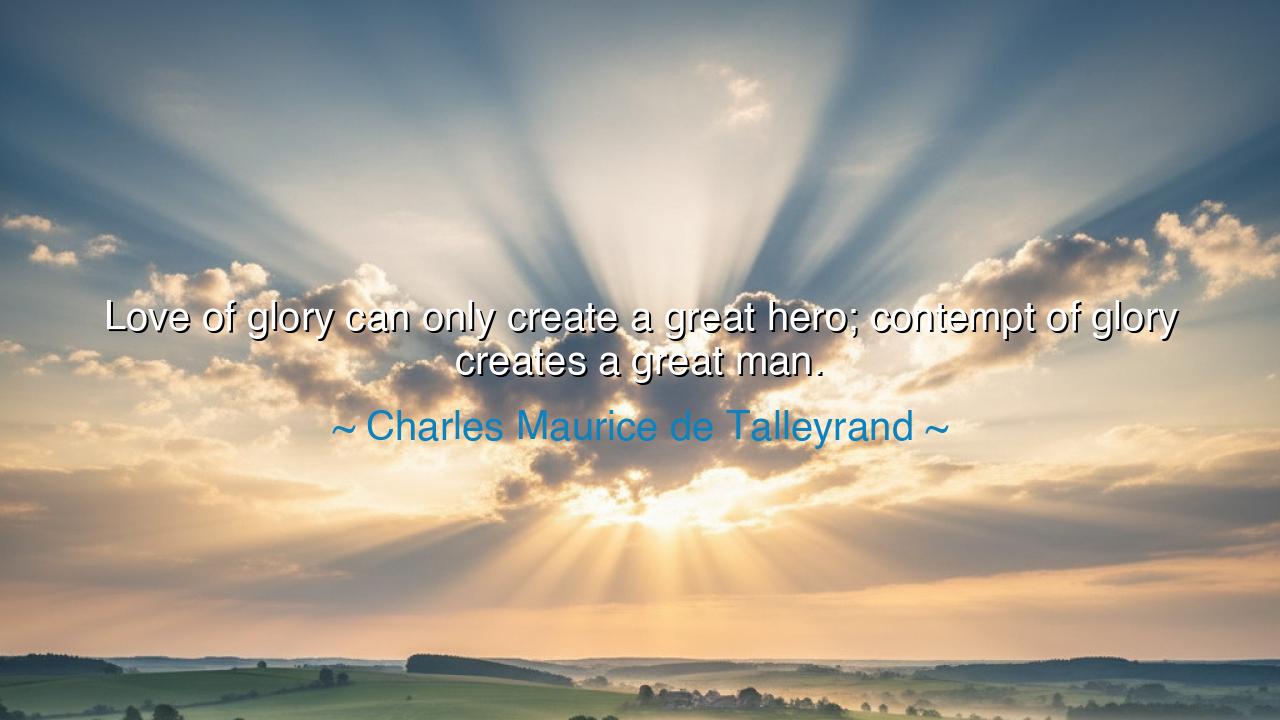
Love of glory can only create a great hero; contempt of glory






Hearken, O children of courage and contemplation, and attend to the words of Charles Maurice de Talleyrand: “Love of glory can only create a great hero; contempt of glory creates a great man.” Here lies a meditation upon the eternal truths of ambition, virtue, and the pursuit of greatness. From the dawn of history, men have sought honor and recognition, striving to inscribe their names upon the annals of time. Yet Talleyrand reveals a profound distinction: the love of external praise may summon feats of heroism, but only the disregard for glory—tempered by wisdom, humility, and principle—creates a man whose greatness endures beyond fleeting acclaim.
Consider the nature of the hero, whose deeds blaze like lightning upon the battlefield, the stage, or the council hall. Heroes attract admiration, provoke awe, and inspire emulation. Alexander of Macedon, fiery and ambitious, carved empires in pursuit of immortal renown. His victories resounded through the ages, yet they were fueled as much by the hunger for glory as by valor. A hero’s greatness is visible, celebrated, and often contingent upon the eyes of others; it burns brightly, but can fade when the audience departs.
Yet Talleyrand speaks also of the great man, whose stature arises not from applause but from principle. Marcus Aurelius, Emperor and philosopher, reigned with wisdom, moderation, and justice, often placing duty above recognition. His legacy endures not because he sought praise, but because he acted rightly, cultivating virtue, reason, and integrity. The great man moves with quiet purpose, guided by conscience and foresight, indifferent to the transient flames of public approval. His deeds echo not for vanity, but for the enduring good they enact.
This distinction illuminates the perils of ambition rooted in fame. To love glory is to risk vanity, pride, and the tyranny of appearance over substance. Many warriors, politicians, and artists have achieved dazzling feats only to be undone by their attachment to recognition, their judgment clouded by the desire to be lauded rather than to act rightly. Talleyrand, himself a man of political cunning, understood that true greatness requires the courage to act independent of acclaim, to endure criticism and neglect for the sake of principle.
History offers luminous examples of this truth. Consider George Washington, who could have seized power with unbridled ambition but chose restraint, placing duty above personal acclaim. He became not merely a hero in battle, but a great man in the history of nations, remembered for virtue as much as for victory. His contempt for the trappings of glory—his willingness to relinquish power and act selflessly—ensured that his name endured with honor beyond mere heroic feats.
From this teaching emerges practical wisdom. Seek not only achievement, but the cultivation of character. Measure your actions not by the applause they may earn, but by their righteousness, their contribution to justice, and their alignment with virtue. Strive for excellence in thought and deed, yet let the desire for recognition be subordinate to the pursuit of integrity. In this way, one may attain greatness that is both durable and meaningful.
Let the generations remember this eternal truth: heroes shine in moments, but great men endure through ages. Charles Maurice de Talleyrand’s insight is a beacon for those who aspire to leave a legacy: seek virtue, act rightly, and place principle above praise. In doing so, you transcend the ephemeral allure of glory and cultivate a greatness rooted in wisdom, integrity, and enduring impact.
Therefore, O seeker of wisdom, temper ambition with humility, valor with conscience, and achievement with principle. Pursue the path of the great man, not the fleeting hero, and let your deeds be guided by purpose rather than applause. In this, you secure a legacy not of transient fame, but of lasting reverence—a testament to the enduring power of contempt of glory and the quiet majesty of true greatness.






AAdministratorAdministrator
Welcome, honored guests. Please leave a comment, we will respond soon